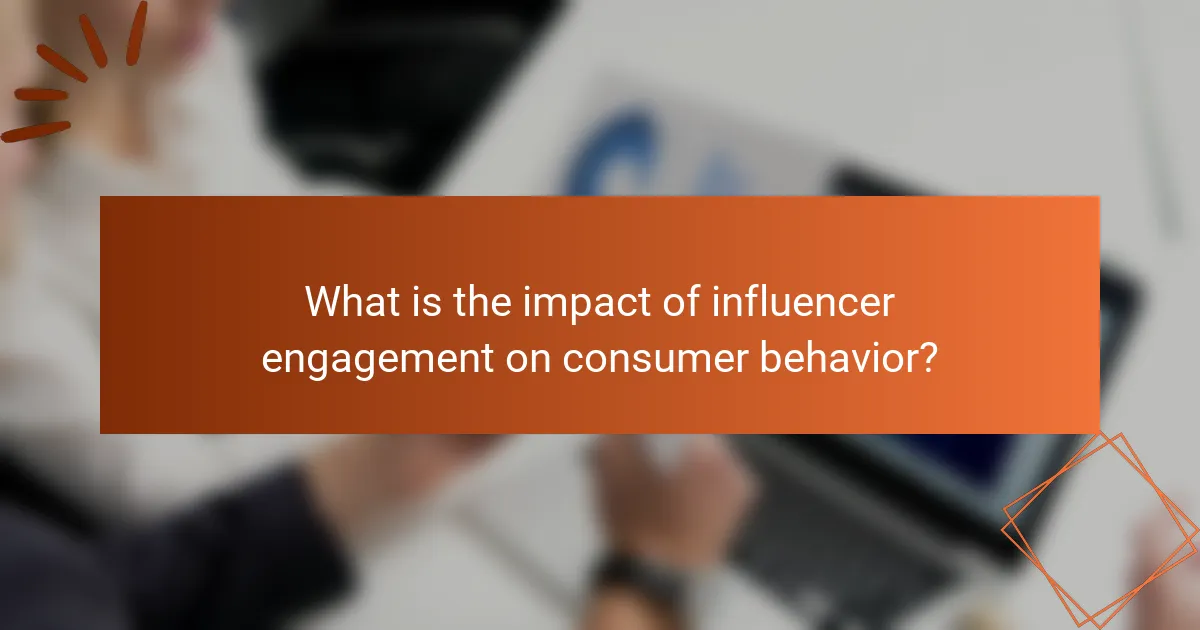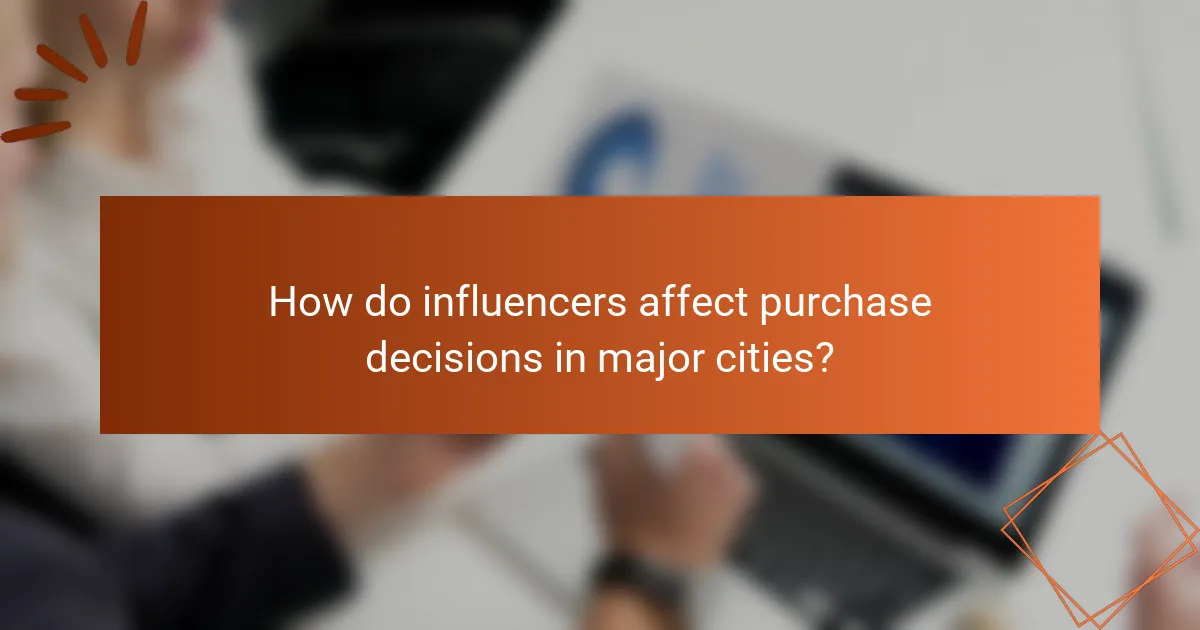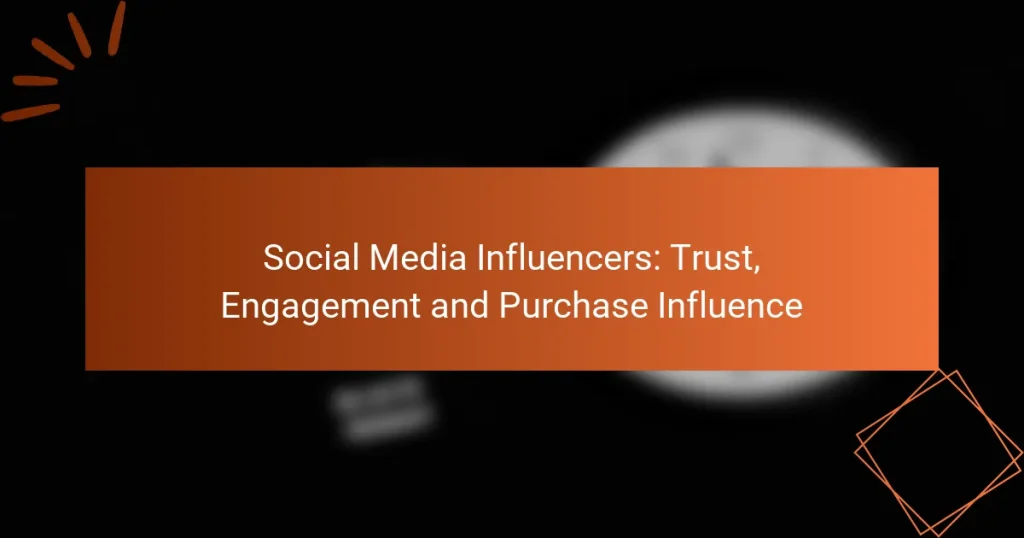Social media influencers play a pivotal role in shaping consumer behavior by building trust through authenticity and engagement. Their ability to connect genuinely with followers fosters loyalty and encourages action on their recommendations, making influencer partnerships a powerful marketing strategy. Selecting the right influencer, aligned with your brand values and audience, is essential for maximizing impact and driving purchase decisions.

How do social media influencers build trust?
Social media influencers build trust through authenticity, engagement, and transparency. These elements create a genuine connection with their audience, fostering loyalty and encouraging followers to act on their recommendations.
Authenticity in content
Authenticity is crucial for influencers as it resonates with their audience. When influencers share personal stories, experiences, or opinions, they appear more relatable and trustworthy. This can include behind-the-scenes content or candid moments that showcase their real lives.
To maintain authenticity, influencers should stay true to their values and avoid promoting products that do not align with their personal brand. Followers can often sense insincerity, which can damage trust and engagement.
Engagement with followers
Engagement is a key factor in building trust, as it fosters a sense of community. Influencers who actively respond to comments, messages, and questions create a dialogue with their audience, making followers feel valued and heard.
Regularly interacting through live sessions, Q&As, or polls can enhance this connection. Influencers should aim to create content that encourages feedback and participation, which can further strengthen their relationship with followers.
Transparency in partnerships
Transparency regarding partnerships is essential for maintaining trust. Influencers should clearly disclose sponsored content and collaborations to their audience, following guidelines set by regulatory bodies like the Federal Trade Commission (FTC) in the U.S.
By being upfront about paid promotions, influencers demonstrate integrity and respect for their audience’s trust. This practice not only complies with regulations but also reinforces their credibility, as followers appreciate honesty in advertising.

What is the impact of influencer engagement on consumer behavior?
Influencer engagement significantly shapes consumer behavior by fostering trust and encouraging interactions that lead to purchasing decisions. When influencers actively engage with their audience, they create a sense of community and authenticity, which can drive consumer interest and loyalty.
Increased brand awareness
Influencer engagement enhances brand visibility by introducing products to new audiences. When influencers share their experiences with a brand, their followers become more familiar with the product, leading to greater recognition in the market.
For example, a beauty influencer showcasing a skincare line can reach thousands of potential customers who may not have encountered the brand otherwise. This exposure can result in a significant uptick in brand awareness, especially among niche demographics.
Higher conversion rates
Engagement from influencers often translates into higher conversion rates as their endorsements can effectively persuade followers to make purchases. When consumers see relatable figures using a product, they are more likely to trust its efficacy and buy it themselves.
Brands can expect conversion rates to improve by leveraging influencer partnerships, particularly when influencers provide discount codes or exclusive offers. This strategy not only incentivizes purchases but also tracks the effectiveness of the influencer’s impact.
Enhanced customer loyalty
Influencer engagement fosters a deeper connection between consumers and brands, leading to enhanced customer loyalty. When influencers consistently interact with their audience and share authentic content, they build trust that encourages repeat purchases.
For instance, a fitness influencer who regularly shares workout routines and nutrition tips alongside a specific supplement brand can create a loyal customer base. Followers are more likely to stick with the brand, feeling a personal connection through the influencer’s ongoing engagement.

How to choose the right influencer for your brand?
Selecting the right influencer is crucial for effectively promoting your brand. Focus on their alignment with your values, audience demographics, and engagement metrics to ensure a successful partnership.
Alignment with brand values
Choose influencers whose values resonate with your brand’s mission and vision. This alignment fosters authenticity, making it easier for their audience to trust both the influencer and your brand.
For example, if your brand emphasizes sustainability, partnering with an influencer who advocates for eco-friendly practices will enhance credibility and appeal to like-minded consumers.
Audience demographics
Understanding the demographics of an influencer’s audience is essential for targeting the right consumers. Analyze factors such as age, gender, location, and interests to ensure they match your target market.
For instance, if your product is aimed at young adults, collaborating with influencers whose followers are primarily in the 18-24 age range will likely yield better engagement and conversion rates.
Engagement metrics
Engagement metrics, such as likes, comments, shares, and overall interaction rates, are key indicators of an influencer’s effectiveness. High engagement often correlates with a loyal and active audience.
Look for influencers with engagement rates above industry averages, typically around 1-3% for larger accounts and higher for smaller ones. This ensures that your brand message reaches an attentive audience.

What are the pricing models for influencer marketing?
Influencer marketing pricing models vary widely, allowing brands to choose options that best fit their budget and goals. Common models include pay-per-post rates, commission-based structures, and long-term partnership agreements, each with distinct advantages and considerations.
Pay-per-post rates
Pay-per-post rates involve brands compensating influencers for each individual post or piece of content they create. This model typically ranges from a few hundred to several thousand dollars, depending on the influencer’s reach and engagement levels.
When using this model, brands should consider the influencer’s audience demographics and the expected return on investment (ROI). It’s crucial to negotiate terms upfront, including content rights and usage duration.
Commission-based models
Commission-based models reward influencers based on the sales they generate through their promotional efforts. This often involves providing influencers with unique discount codes or affiliate links to track conversions.
Brands can expect commission rates to vary, commonly falling between 5% to 20% of the sale price. This model aligns the interests of both parties, as influencers are incentivized to drive sales effectively.
Long-term partnership agreements
Long-term partnership agreements establish ongoing relationships between brands and influencers, often resulting in a more authentic representation of the brand. These agreements can include a series of posts, campaigns, or exclusive collaborations over an extended period.
Brands should consider the benefits of consistency and trust-building with audiences when opting for this model. While initial costs may be higher, the potential for increased brand loyalty and engagement can yield significant long-term returns.

How do influencers affect purchase decisions in major cities?
Influencers significantly impact purchase decisions in major cities by shaping consumer perceptions and preferences through their curated content. Their ability to engage with local audiences fosters trust, making followers more likely to purchase products they endorse.
Localized content strategies
Localized content strategies involve tailoring influencer messages to resonate with specific urban demographics. This can include using local slang, referencing popular city landmarks, or highlighting regional trends. For example, an influencer in New York might promote a fashion brand by showcasing outfits suitable for the city’s fast-paced lifestyle.
To maximize effectiveness, brands should collaborate with influencers who have a strong understanding of local culture and consumer behavior. This ensures that the content feels authentic and relevant, increasing the likelihood of engagement and conversion.
Targeted campaigns in urban areas
Targeted campaigns in urban areas leverage data analytics to identify and reach specific consumer segments. Influencers can create campaigns that focus on local events, seasonal trends, or city-specific promotions. For instance, a campaign for a new café might include influencer visits during a local food festival, generating buzz and attracting foot traffic.
Brands should consider using geo-targeted ads alongside influencer partnerships to enhance visibility. This dual approach can lead to higher engagement rates, as consumers are more likely to respond to promotions that are relevant to their immediate environment.

What are the ethical considerations in influencer marketing?
Ethical considerations in influencer marketing revolve around transparency, authenticity, and the potential for misleading audiences. Influencers must disclose paid partnerships and ensure their endorsements align with their genuine beliefs to maintain trust with their followers.
Transparency and Disclosure
Transparency is crucial in influencer marketing. Influencers should clearly disclose when content is sponsored or when they receive compensation for promoting products. This can be done using hashtags like #ad or #sponsored, which help audiences understand the nature of the relationship between the influencer and the brand.
Failure to disclose can lead to a loss of trust and potential legal repercussions, as regulations in many countries, including the United States and the European Union, require clear communication of sponsored content. Brands and influencers should familiarize themselves with local laws to ensure compliance.
Authenticity and Trust
Authenticity plays a significant role in maintaining trust between influencers and their audience. Followers are more likely to engage with influencers who share genuine experiences and opinions about products. Influencers should only promote products they truly believe in, as this fosters a more authentic connection.
Brands should choose influencers whose values align with their own to enhance credibility. When influencers endorse products that resonate with their personal brand, it creates a more trustworthy environment for followers, leading to higher engagement rates.
Impact on Audience Perception
The impact of influencer marketing on audience perception can be profound. Influencers have the power to shape opinions and consumer behavior, making it essential for them to act responsibly. Misleading endorsements can result in negative consequences for both the influencer and the brand.
To mitigate risks, influencers should conduct thorough research on the products they promote and consider the potential effects on their audience. Engaging in ethical practices not only protects the audience but also enhances the influencer’s reputation in the long run.


